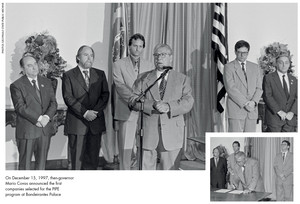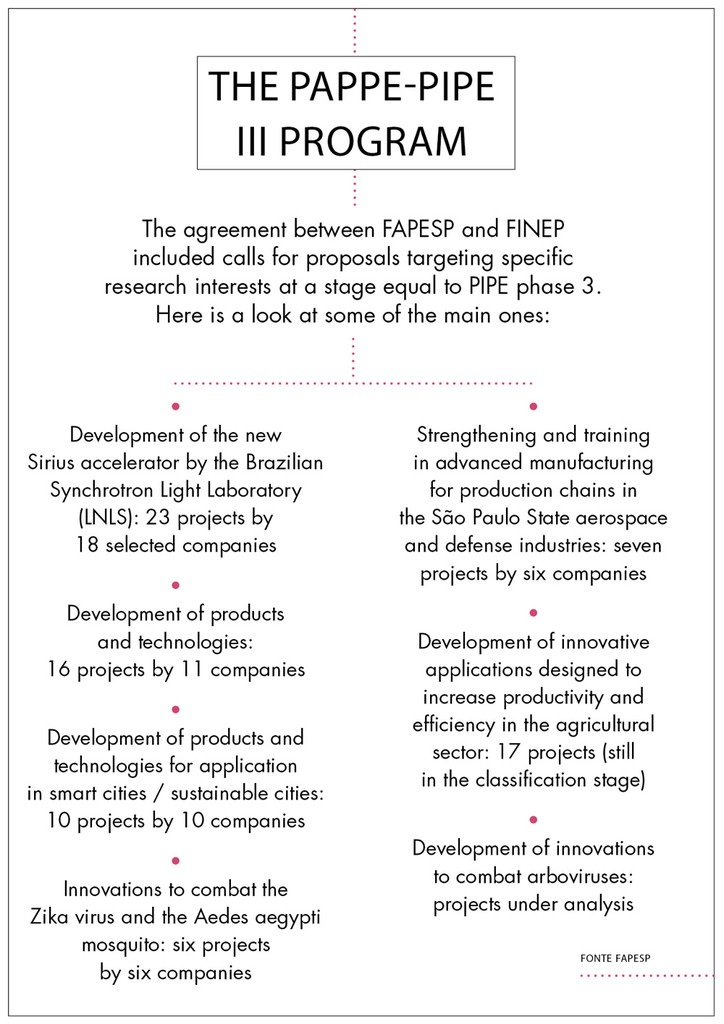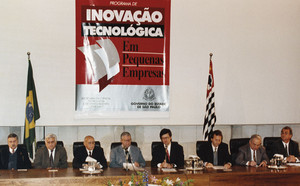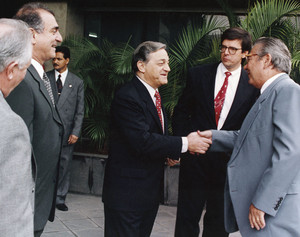 Initiatives designed to stimulate innovation in small businesses—which have become an industry benchmark in Brazil over recent years—were pioneered by FAPESP’s Technological Innovation in Small Businesses program (PIPE) 20 years ago. The key strategy has been to grant economic subsidies to innovative companies, an approach widely used in developed countries that share the costs and risks of research and development (R&D) between the government and the private sector. “PIPE was a landmark initiative, because it was the first time in Brazil that non-repayable public funds were being invested in innovative companies—sometimes referred to as lost money, which is wrong because this type of investment has a huge economic and social impact,” explains physicist José Fernando Perez, who was scientific director at FAPESP when the program was launched. “I believe this contribution has played a major part in the cultural change that has taken place in Brazil regarding the government’s role in stimulating innovation.”
Initiatives designed to stimulate innovation in small businesses—which have become an industry benchmark in Brazil over recent years—were pioneered by FAPESP’s Technological Innovation in Small Businesses program (PIPE) 20 years ago. The key strategy has been to grant economic subsidies to innovative companies, an approach widely used in developed countries that share the costs and risks of research and development (R&D) between the government and the private sector. “PIPE was a landmark initiative, because it was the first time in Brazil that non-repayable public funds were being invested in innovative companies—sometimes referred to as lost money, which is wrong because this type of investment has a huge economic and social impact,” explains physicist José Fernando Perez, who was scientific director at FAPESP when the program was launched. “I believe this contribution has played a major part in the cultural change that has taken place in Brazil regarding the government’s role in stimulating innovation.”
A new landscape was established over the following years, encouraged by certain legal developments such as the Innovation Act of 2004, which authorized and regulated the granting of public funds to businesses and allowed university researchers to work in the private sector. The 2005 “Lei do Bem” law went a step further, creating tax incentives for R&D and technological innovation, although its mechanisms have been used more by well-established companies than by startups. The National Statute for Micro and Small Enterprises, approved in 2006, has a chapter dedicated to innovation, establishing that federal, state, and municipal governments and their development agencies shall offer specific innovation programs for small businesses. “The PIPE program preceded the spirit of the statute by almost nine years, although it was not a direct inspiration for it,” says Guilherme Ary Plosnki, scientific coordinator of the Technology Policy and Management Center at the University of São Paulo (USP) and vice-director of the Institute for Advanced Studies.
More specifically, says Plonski, PIPE served as a model for the 2003 creation of the Support for Research in Businesses Program (PAPPE) by the Brazilian Funding Authority for Studies and Projects (FINEP), aimed at supporting innovation in technology companies and implemented in partnership with state research support foundations. Physicist Sergio Machado Rezende, who became FINEP President in 2003, followed PIPE’s progress from its inception and proposed a federal program in a similar mold. “I learned about the program years earlier from a presentation given by Perez at a meeting of physicists, and I was really impressed by the idea. It was replicating interesting research support systems offered to small businesses in the United States,” recalls Rezende, who was also the Brazilian Minister of Science, Technology, and Innovation between 2005 and 2010.
 In early 2003, Rezende invited Perez, from FAPESP, to present a lecture on the program to FINEP technical staff. This meeting led to a partnership that is still bearing fruit today. FINEP launched the PAPPE program, but its implementation in the state of São Paulo was integrated with PIPE to avoid overlapping efforts. The risk was that if the two programs were identical, PAPPE might only receive proposals that had already been rejected by PIPE, and were therefore of a low quality. The solution was to adopt a particular strategy for small enterprises in São Paulo: while PIPE would continue to fund phase 1 projects (aimed at demonstrating the technical and commercial viability of an innovation) and phase 2 projects (development of the research itself), PAPPE would function in a complementary capacity, supporting phase 3 projects, which involve final development of the innovation and its commercialization—a step that the FAPESP regulations prohibit the foundation from funding. The PIPE and PAPPE programs remain coordinated to this day.
In early 2003, Rezende invited Perez, from FAPESP, to present a lecture on the program to FINEP technical staff. This meeting led to a partnership that is still bearing fruit today. FINEP launched the PAPPE program, but its implementation in the state of São Paulo was integrated with PIPE to avoid overlapping efforts. The risk was that if the two programs were identical, PAPPE might only receive proposals that had already been rejected by PIPE, and were therefore of a low quality. The solution was to adopt a particular strategy for small enterprises in São Paulo: while PIPE would continue to fund phase 1 projects (aimed at demonstrating the technical and commercial viability of an innovation) and phase 2 projects (development of the research itself), PAPPE would function in a complementary capacity, supporting phase 3 projects, which involve final development of the innovation and its commercialization—a step that the FAPESP regulations prohibit the foundation from funding. The PIPE and PAPPE programs remain coordinated to this day.
Soon after the 2004 Innovation Act came into force, FINEP expanded its business support scheme by launching more aggressive economic subsidy programs. As well as PAPPE, the agency began managing other initiatives such as the Prime program, aimed at startup companies, and PAPPE Economic Subsidies. It also established repayable funding options for high-technology sectors through programs such as Zero Interest. The Brazilian Development Bank (BNDES) has also created programs to support innovation in small enterprises. One of them, called FUNTEC, offers grants to projects involving partnerships between businesses and technological institutions.
PIPE was inspired by the Small Business Innovation Research (SBIR) program supported by 11 research funding agencies in the United States (see article on page 28), but was adapted by FAPESP to suit the Brazilian environment in 1997. At that time, the law still did not allow public money to be granted to the private sector, so PIPE funding was awarded to the lead researcher responsible for the project, who could be the business owner or a contracted specialist. This model is still used today.
Ingenious solution
The way the program was designed offered an ingenious solution that enabled small companies to establish a physical structure for technological research and innovation. The funding offered by FAPESP can be used for permanent assets, such as research equipment, and for consumable goods, such as reagents and supplies. It also provides a salary for the lead researcher, something essential for new businesses that are not yet generating revenue, as well as technical training grants for employees who may become part of the company’s R&D team after the project has been implemented.

EDUARDO CESAR
The PIPE launch ceremony, held at FAPESP headquarters on June 18, 1997EDUARDO CESARWhile today there are numerous companies using public funds to create new products and services, in the 1990s there was a lack of trust in the Brazilian productive sector’s ability to innovate, observes José Fernando Perez. In the days before PIPE was launched, there were fears that few businesses would be interested in submitting projects. “It was a relief when we saw more than 80 applicants, from which 32 companies with strong project proposals were selected,” recalls Perez. He says that Mario Covas, the governor of São Paulo at the time, was also surprised by the results. Covas was present when the PIPE program and its initial projects were announced, an event that took place at Bandeirantes Palace—the governor’s residence—at his request. There was also resistance from universities to the idea of allocating public resources to research in companies. “The state constitution had increased funding for FAPESP, and the foundation was entirely responsible for investing in innovation as it saw fit, but there were concerns that university research would be sacrificed,” says Perez.
In 1995, two years before PIPE began, FAPESP had already made its first move toward promoting innovation in companies by setting up the Partnership for Technological Innovation program (PITE), which supports collaborations between businesses and universities to address technological bottlenecks, and FAPESP funding for each project requires an equivalent investment from the company involved. The PITE program had funded 245 projects by December 2017. Despite the program’s innovative nature, research institutions maintained their role as the place of knowledge development: funding was given to the scientific institutions, which led the projects. PIPE went a step further and broke through this barrier.
While PIPE has helped to change the innovation landscape in Brazil over the last 20 years, there is still a long way to go. “PIPE was a precursor to the changes that followed. The merits of the program are indisputable and the number of companies benefiting speaks for itself, but this initiative alone could not be expected to change the business world overnight,” says economist Marcelo Pinho, a professor at the Federal University of São Carlos (UFSCAR). One major challenge, according to Pinho, is to create the conditions needed for small technology companies to grow into large ones, something that has not yet happened in Brazil.

EDUARDO CESAR
At the program launch, Governor Mario Covas is greeted by then FAPESP CEO Francisco Romeu Landi, Scientific Director José Fernando Perez (left), and President Carlos Henrique de Brito Cruz (right)EDUARDO CESARPinho recently studied the so-called “unicorn companies,” the name given to startups worth more than US$1 billion before launching an initial public offering, such as Uber and Airbnb, for example. “There has never been a Brazilian unicorn company. Creating companies based on disruptive innovation is not uncommon only in Brazil—excluding China and India, such companies are rarely created in developing countries,” he says. Pinho believes the national innovation system needs to evolve so that PIPE and other initiatives can support more companies producing innovations capable of competing on the global market, reducing the number that are only aimed at the demands of the domestic market.
Training
Recent changes by PIPE demonstrate an increasing concern with teaching entrepreneurs how to develop good business plans and successfully introduce products or services to the market. The PIPE Entrepreneur initiative provides intensive seven-week training courses to employees of companies working on phase 1 projects under the program, led by mentors recruited from the industry. Over this period, participants rework their business models and receive training on how to interview clients and fine-tune their ideas in relation to market expectations. “The course is focused on the commercial side of things, aimed at companies with a high potential for growth where knowledge itself can become business,” says Milton Mori, a professor at the UNICAMP School of Chemical Engineering, who was CEO of innovation agency Inova Unicamp between 2013 and 2017. He compares the profile of PIPE Entrepreneur companies with that of more than 500 companies founded based on knowledge generated at universities. According to Mori, UNICAMP’s child companies were mostly started by alumni, many of whom were supported by academic and business mentors who helped strengthen their projects.
In recent years, the PIPE program has had the largest number of contracts in its history, and has responded by committing increased levels of funding, reaching 6% of the FAPESP budget. “In São Paulo, FAPESP accelerated PIPE activities during the financial crisis. In 2015, 2016, and 2017, the number of contracts approved was the highest in the history of the program, and between January and November 2017, the rate was more than one project per business day,” says the Foundation’s scientific director, Carlos Henrique de Brito Cruz. “The high-tech ecosystem in the state of São Paulo is thriving, and with the help of the PIPE program, it is contributing to the development of the state and the country.”
Republish